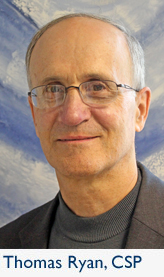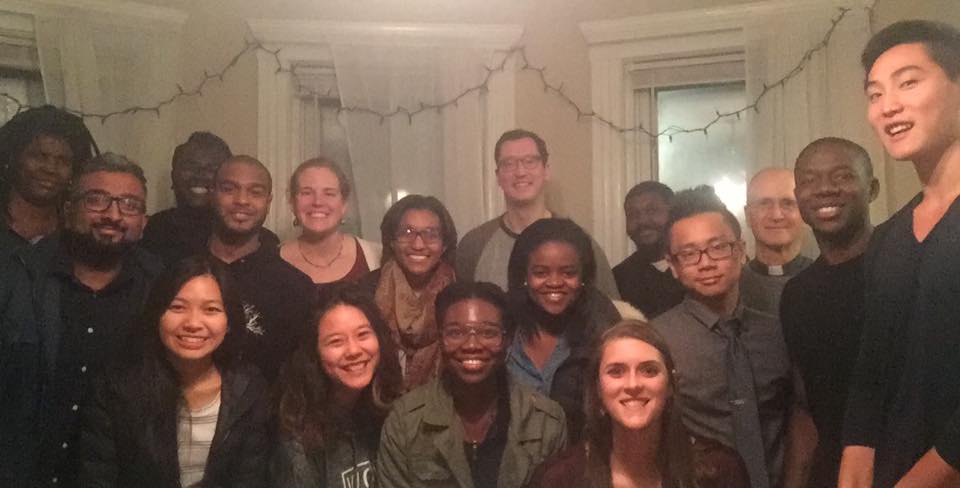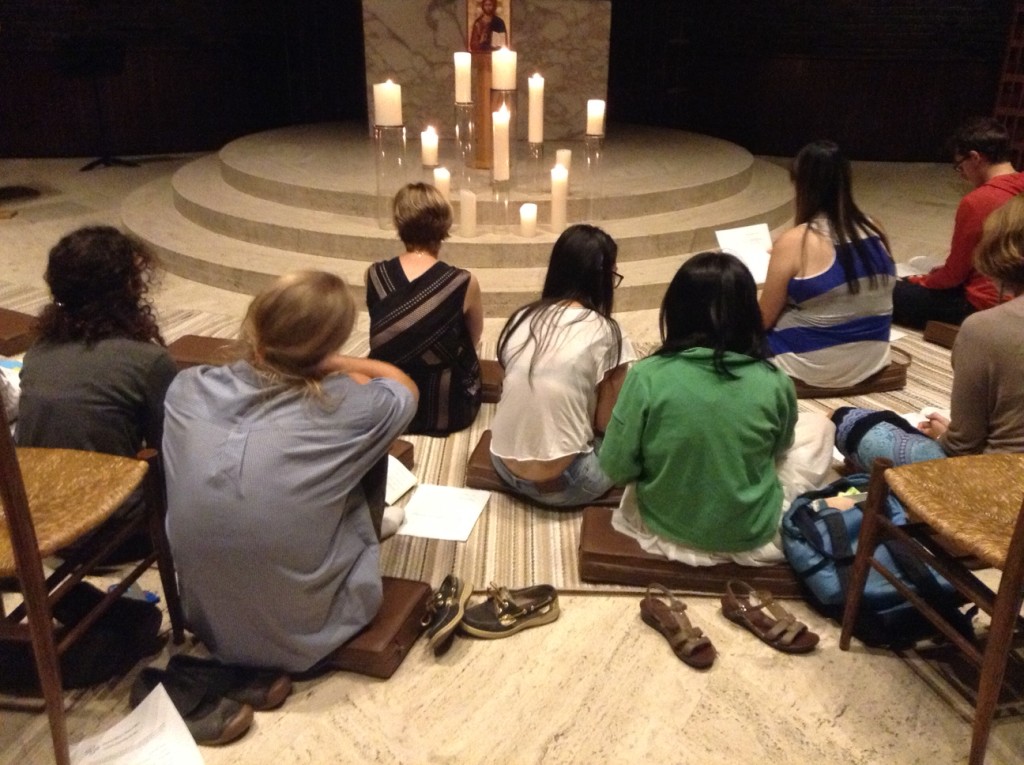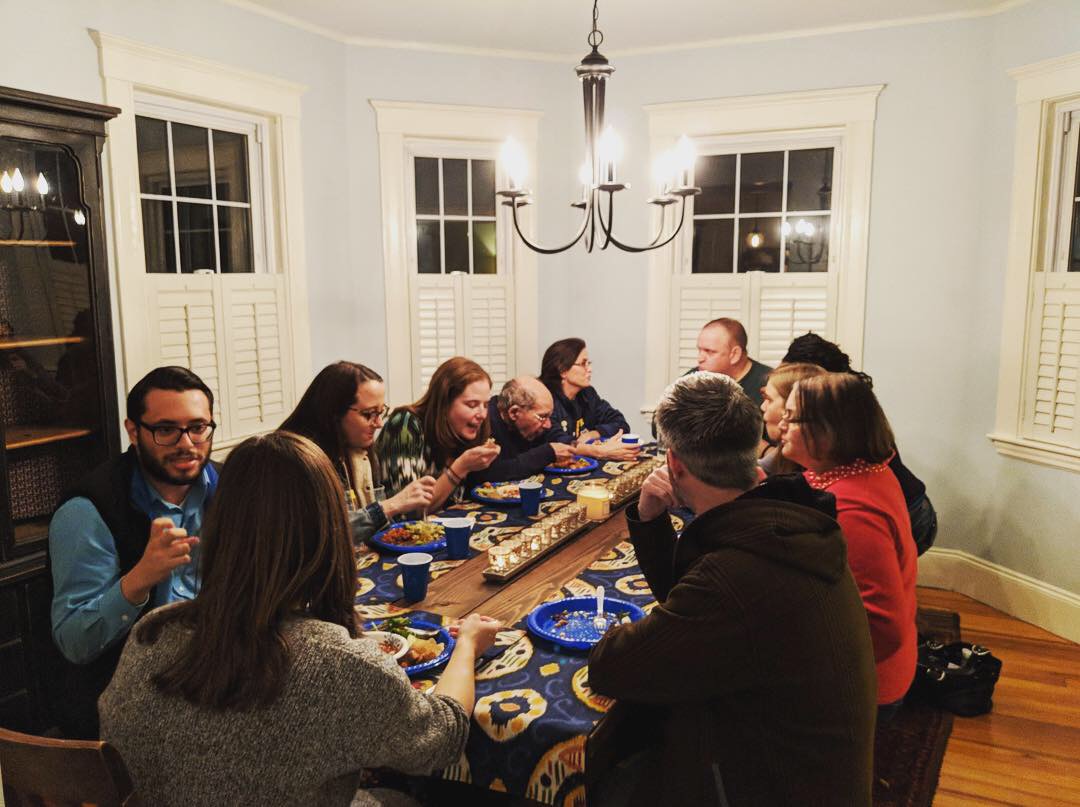Join the Metrowest Interfaith Community on Dec. 3rd for Interfaith Prayer for Peace In Israel, Palestine, and Here – a candlelight prayer and potluck supper! We’re excited to gather with our Jewish and Muslim neighbors, focus on the human tragedy on both sides, and bring our grief and hope to prayer together over a shared meal!
A Musical Exploration of the Psalms
Explore the psalms in a unique and unforgettable way.
This unique interactive event uses live musical performances as a springboard for discussion about Scripture and faith.
Participants gather to hear world-premiere performances of brand-new musical compositions inspired by the psalms, then join each other in conversation about the ways these pieces help us experience and understand Scripture. Almost like a ‘musical Bible study”, this spiritual formation event brings to life these ancient texts in meaningful and memorable ways.
Join us to witness the power of the arts to bring together Christians in unity, fellowship, and conversation!
This free event is open to all. No musical experience is necessary – just a willingness to open your hearts to Scripture in a new way!
The culmination of a yearlong collaboration between composers and performers representing a wide variety of Christian traditions, this ecumenical event celebrates the unique power of the arts to bring together Christians in fellowship and mutual conversation around our shared love for Scripture.
Fratelli Tutti – Everyone is Connected: Brothers and Sisters, All
Sunday, January 3, 2021, 4 – 5:30pm
Online via Zoom
(Registration ends at 3pm on the day of, and the Zoom link will be sent right after that)
Fr. Tom Ryan of the Paulist Center will deliver remarks on Pope Francis’ encyclical, Fratelli Tutti, reflecting on how we can all live out the call to fraternity, social friendship, and solidarity. We could not think of a more fitting way to begin the new year. Father Tom Ryan is also a member of the UniteBoston Board of Directors. Responding to him will be Boston Islamic Seminary President Dr. Basyouny Nehela and others to be announced. Audience Q&A will follow the presentations.
Born and raised in southern Minnesota, Fr. Tom Ryan did his graduate studies in theology at the Washington (D.C.) Theological Union and the University of Geneva. He was ordained a Paulist in 1975, and served in campus ministry at the Ohio State University (Columbus) and at McGill University (Montreal, QC.), prior to directing the Montreal-based Canadian Centre for Ecumenism for 14 years and working in all ten provinces of Canada. Perceiving the need for places where Christians of different traditions could gather to share faith and life with each other as well as with members of other religions, he spearheaded the founding of Unitas in Montreal, an ecumenical center for spirituality and Christian meditation co-sponsored by eight different denominations. He served as its director for five years prior to answering the call of his community in January of 2000 to set up and develop the Paulist Office for Ecumenical and Interfaith Relations.
Dr. Basyouny Nehela holds an M.A. in Fundamentals of Religion, and a Ph.D. with Honors in Da’wa and Islamic Culture, both from Al-Azhar University. He is currently the Dean of Academic Affairs and professor at Boston Islamic Seminary. Dr. Basyouny was previously an Associate professor at Qatar University’s Faculty of Sharia and Islamic Studies, Department of Islamic Creed and Da’wa, a faculty member at Al-Azhar University and Islamic American University, and Imam of the Islamic Society of Boston. He has also served as head, and coordinator of many academic committees covering Curriculum Enhancement, Core Curriculum, Strategic Plan, Academic Activities and Events, & Professional Development. He has taught many academic courses including Fundamentals of Dawa, Ethics, Comparative Religion, Islamic Creed, Islamic Culture, Quranic Studies,…etc.
To register, click here. For more info, please visit www.coopmet.org or email info@coopmet.org
The Lord’s Prayer Experience
An ecumenical transformance: Holy Family parish is pleased to host composer Yosef Kottlerin gathering Catholics, Protestants, Orthodox, & Jews to celebrate our common roots while honoring each other’s paths through a prayer so common to us.
There are two ways to participate:
1. Just come to the event itself on May 19th
2. In addition to that, join the event choir, which involves also coming to rehearsal at Holy Family on May 13th, 7:30-9pm.
In the composer’s words: An uplifting journey into song & spirit—accompanied by a rhythmic jazz ensemble & interfaith chorale…Our goal is to connect in a deep way with each other and with all who join us. As we pray the music and sing the prayer, we affirm the power of love to make the world a better place. We envision each concert as a “Transformance” through which we share the transformational power of the Lord’s Prayer as a way to honor our relationships with each other and our world.
Join us in Joyful Song to Celebrate our Common Unity! Wine and cheese will be served
Produced by One Spirit Foundation. To learn more, visit: onespiritfoundation.org
To contact the host parish: Dr. Elizabeth Smith, pastoral associate, pastoralassociate@holyfamilyconcord.org
OPEN TO MUSICIANS AND NON-MUSICIANS ALIKE!
What does it mean today to be ecumenical?
“The message we joyfully proclaim is that we are reconciled to God and to one another through the life, death and resurrection of Jesus. “Being ecumenical” means feeling a holy unrest at our failure to live consistent with our message, more interested in proving our “rightness” and the other’s “wrongness” than in seeking together to know what the Spirit is asking of us and to do it.”

You may hear people using the term “ecumenical,” but what does it mean? The word “ecumenism” is used to describe the efforts to bring together Christians of varying traditions and backgrounds. This week’s blog is written by Father Tom Ryan, director of the Paulist Office for Ecumenical and Interfaith Relations in downtown Boston. Father Tom has valuable recommendations for how all Christians can be “ecumenical” in their day-t0-day lives. Read his post below to learn how you can take part in the healing movement of uniting God’s separated people.

What Does It Mean Today To Be Ecumenical?
by Fr. Tom Ryan, CSP
Recently a friend asked, “What does being ‘ecumenical’ mean?” It was one of those questions that stop you cold because the answer goes off in so many directions you don’t know where to begin. Later, I took paper and pencil in hand and began to reflect on the lessons of my last 35 years in ecumenical work.
Here are some of the things which, in my experience, “being ecumenical” means:
1. To pray regularly for the unity of the Church, as Christ wills it and when he wills it. As theologian, Yves Congar, said; “The way through the door of unity is on our knees.” Prayer is important because prayer’s effect is in us. Prayer changes our hearts, and it is our hearts that most of all need to be changed.

2. To be rooted in a particular Christian tradition, to know it well, and to be able to present to others the coherency of that tradition’s response to the Gospel. The genuine ecumenists are not at the margin of their church’s life, but at the heart of it. They know what is important in the Christian life and can recognize those elements in other churches even if they may be differently expressed.
3. To take an active part in the careful and honest appraisal of whatever needs to be done for the renewal of one’s own church. Ecumenism is not a specialty within the Church, but an expression of every dimension of its life. It helps the Church to be more the Church and to be faithful to her calling. Dialogue is the meeting of churches.
4. To be fascinated and curious about that which is different. Risk peeping out of our provincial perspectives and opening ourselves to the bigger picture. Ecumenism is a way of living that dares to think globally and live trustfully with differences in community.
5. To be willing to learn. Truth is seldom discovered in isolation but rather through dialogue in diverse community. Each Christian tradition has preserved better than others one or more aspects of the mystery of God’s work in Christ. The work of unity aims at restoring the fullness to our common appreciation of that mystery.

6. To cultivate a historical consciousness. We’re on a journey. The church we have is not the church God wants. An ecumenically minded person refuses to worship false gods, and the present expression of the church is not God. Similarly, there is a refusal to make absolute a stage of development that is only the next step on the way to something greater.
7. To be ready to celebrate vitality in the body of Christ wherever it is found. What advances the reign of God in any church helps all churches. The churches are not like competing corporations in the business world, so that the stakes of one rises as the lot of others falls. Any loss of divine truth and life is a loss to Christ and his Church. The only triumph a Christian seeks is that of Jesus and his cross. Our rivalry is not with one another, but with sin.
8. To be willing to work together. Ecumenism is an understanding of human society that identifies fear of the “other” as one of the greatest evils we face. The principle given to all the churches for their life together is: Do everything together as far as conscience permits.
9. To feel the scandal of our divisions. Unity is for mission. Our primary mission is to announce the Good News. The message we joyfully proclaim is that we are reconciled to God and to one another through the life, death and resurrection of Jesus. “Being ecumenical” means feeling a holy unrest at our failure to live consistent with our message, more interested in proving our “rightness” and the other’s “wrongness” than in seeking together to know what the Spirit is asking of us and to do it.
10. To be open to God’s will for the Church. Our unity is God’s gift, and the way to give more visible expression to that gift will also be God’s gift. But we will have to empty ourselves of our self-righteousness and let go of our power games in order to let this be God’s work.
11. To appreciate the important role of provisional regulations and church structures in our evolution from alienation to reconciliation. To accept that the only constant is change and the only refuge is the insecure security of faith. To struggle against the temptation to live in a closed, safe, secure system that reduces our level of fear and satisfies our desires for control. God is a verb. And in the dynamism of the provisional, God’s Spirit is at work, endlessly correcting, improving, adjusting, reorienting.
12. To have an appreciation for the hierarchy of truths in Christian doctrine. A belief has greater or lesser consequence in the measure in which it relates to the foundation of the Christian faith. Grace has more importance than sin, the mystical aspect of the Church more than it’s juridical, the Church’s liturgy more than private devotions, baptism more than penance, the Eucharist more than the anointing of the sick. Placing the greater stress on those doctrines in closest relation to the heart of Christian faith enables us to build further agreement.
13. To try to understand others as they understand themselves. To avoid any expression, judgment or action that falsifies their condition. Ecumenical honesty means we do not look upon others through the prism of their weakest elements, or over-generalize their positions with statements like “Protestants say … Anglicans do … Orthodox are … Catholics will …” Rather, our ideals are put next to their ideals, our practices next to their practices, as opposed to our ideals next to their practices.

14. To be alert to the presence of God and the action of the Holy Spirit in the lives of other Christians and members of other living faiths. The Church of God does not have a mission as much as the mission of God has a church. The Church is the sign and sacrament of God’s presence in the world, but God’s activity is by no means limited to the Church and its members. The Church serves the advance of the Kingdom but is not tantamount to it.
15. To have a biblical patience. Biblical patience calls for creative waiting, doing now what we can instead of moaning about what church disciplines will not allow us to do. It means being willing to accept or absorb negativity so that the person who is the source of it will eventually go beyond it. Christ suffered for unity. At times so will we. Biblical patience involves staying with it, searching for the healing that comes from understanding and forgiveness. Everyone is in favor of Christian unity. Some are even willing to work for it. But few are willing to suffer for it.
Fr. Tom Ryan leads the Paulist National Office of Ecumenical and Interfaith Relations. You may find more information about the office, it’s newsletter/journal Koinonia, ecumenical retreats, and inter-congregational Gospel Call missions at tomryancsp.org
- 1
- 2
- 3
- 4
- Next Page »